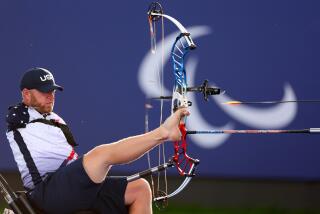Company Offers Just the Right Things for the Left-Out
- Share via
TOLEDO, Ore. — You know who you are.
You’re one of those people whose hand smears the ink as your pen moves across the page. You hold the ruler upside down when you measure, take off your watch to set the time and cross your arms to use some power tools.
You’re a lefty--a misfit in a world designed for right-handers.
You and your kind make up about 10% of the population--a minority group with no champion. You endure. You adapt. Some of you even try to pass for a “normal” right-hander.
But take heart.
Up in the foothills of the Coast Range east of Newport, David and Darla Moe are working to make life a little easier for lefties. Truth be told, they’re both right-handed, but don’t hold that against them.
For the past six years, they’ve been quietly building a business out of their Toledo home called the Left-Handed HeadQuarters. Dial (800) 366-LEFT, and they’ll send you a catalog full of good stuff for southpaws.
*
Like pens with quick-drying ink so your hand won’t smear it. Or a watch with the stem on the left side so you can wear it on your right wrist and still set the time. Even rulers with the numbers running right to left, so a left-hander can use it without having to read the numbers upside down.
Darla Moe, 45, realized the need for such a business more than a decade ago. Thanks to her grown--and left-handed--daughter, Rene, Moe knows something about the trauma of being left-handed in a right-handed world.
“It was hard teaching her things,” Moe remembers. “Tying shoes was a big problem.”
Among the merchandise offered by the Left-Handed HeadQuarters is a flier to help right-handed parents teach left-handed skills.
It’s not a big business, and the market is limited. Many older left-handed people have become so accustomed to a right-handed world that lefty merchandise doesn’t appeal to them, the Moes have found. But they’ve met some lefties who didn’t even know such stuff exists.
The Moes meet many of their customers face to face because they sell at fairs. It’s easy to spot the left-handers in the crowd.
“When they see our sign, they get this big grin on their face,” Darla Moe says.
Left-handed people and their friends and relatives buy items and sign up on catalog mailing lists. The Moes gathered 500 names at their first fair, and the catalog now reaches more than 2,000 people--most in Oregon, but some as far away as the Philippines.
The Moes, who buy from wholesalers specializing in left-handed merchandise, know of no other Oregon retail businesses that caters just to lefties.
At the fairs, the Moes meet people who are proud to be left-handed. They also meet some who are bitter.
“The last time we did a fair, a lady showed me the scars on her knuckles from somebody hitting her when she was a child to prevent her from using her left hand,” Darla Moe says. “I’ve had people tell me about having their hands tied behind their backs. There’s a lot of horror stories.”
But others look upon their left-handedness as a kind of special distinction. They’re the ones who buy the Moes’ shirts and left-handed coffee cups with sayings such as: “God created a few perfect people. The rest are right-handed.”
“It’s a club,” says David Moe, a 43-year-old commercial fisherman who spends six months of the year in Alaska. “A lot of achievers are left-handed.”
Famous left-handed people range from Billy the Kid to Bill Clinton. Studies have shown left-handers tend to be more creative than right-handers, so not surprisingly, a disproportionate number of artists and people in show business are lefties.
Being a lefty also has advantages for some athletes. Some 30% of major league pitchers are left-handed, as are 40% of the top professional tennis players.
Still, being left-handed can be a lifelong struggle.
“More left-handers are born than die,” David Moe says.
Forcing someone to repress their left-handedness can cause problems such as stuttering, he says. Some scientists believe the frustrations of being left-handed may account for the fact that lefties are three times more likely than the rest of the population to become alcoholics.
The Moes are looking for ways to expand their business. They now stock some items at a Newport craft warehouse, and they’re looking for similar outlets in other communities. They’re also putting together a Web site that will allow people to order their merchandise through the Internet.
Maybe, they say, the business will someday grow enough to allow David Moe to give up commercial fishing.
“Getting David out of Alaska,” Darla Moe says. “That’s our goal.”
More to Read
Inside the business of entertainment
The Wide Shot brings you news, analysis and insights on everything from streaming wars to production — and what it all means for the future.
You may occasionally receive promotional content from the Los Angeles Times.










